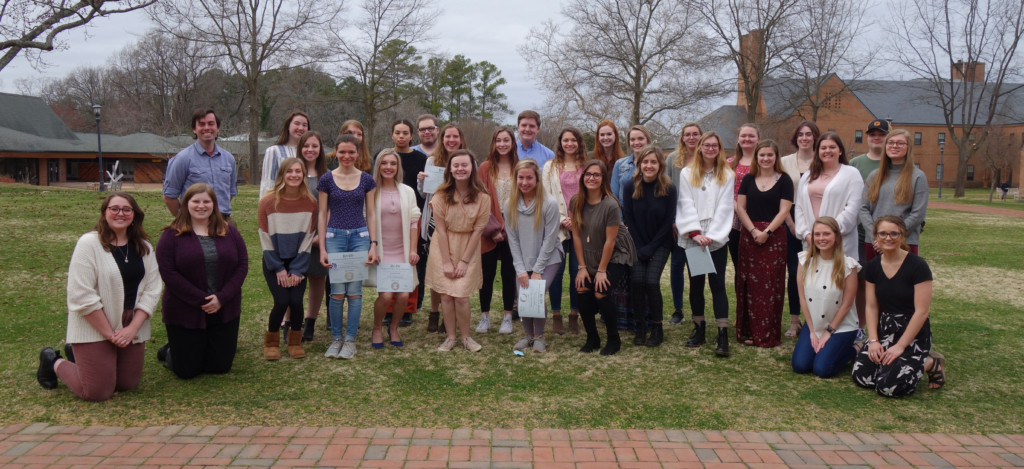 Congratulations to Assistant Professor of Psychology Kristina Howansky who was recently published in the journal Teaching of Psychology!
Congratulations to Assistant Professor of Psychology Kristina Howansky who was recently published in the journal Teaching of Psychology!
Uncover the science behind the mind.
 Congratulations to Assistant Professor of Psychology Kristina Howansky who was recently published in the journal Teaching of Psychology!
Congratulations to Assistant Professor of Psychology Kristina Howansky who was recently published in the journal Teaching of Psychology!
 Congratulations to Professor of Psychology Libby Nutt Williams, who, in collaboration with colleagues from James Madison University, the George Washington University, and Deakin University in Australia, published an article entitled “The Development and Practice of Authentic Leadership: A Cultural Lens” in the European Journal of Training and Development!
Congratulations to Professor of Psychology Libby Nutt Williams, who, in collaboration with colleagues from James Madison University, the George Washington University, and Deakin University in Australia, published an article entitled “The Development and Practice of Authentic Leadership: A Cultural Lens” in the European Journal of Training and Development!
https://doi.org/10.1108/EJTD-03-2021-0039
The purpose of this empirical study was to explore the practice of authentic leadership and understand more about how it is cultivated and sustained. Interviewing an international sample of leaders, across multiple countries, allowed a comparison of leaders in the United States and those outside the United States, as well as a comparison of male and female leaders. The results of the analysis highlight the leaders’ beliefs, values and behaviors, their leadership development, and the barriers and supportive factors they experienced related to their leadership. This study provides insight and direction for individuals and organizations seeking to better understand the practice of authentic leadership, its development and how it can be sustained over time and across contexts and social identities.
 Congratulations to Dr. Libby Williams on her recent publication!
Congratulations to Dr. Libby Williams on her recent publication!
Williams. E. N. (2020). Research with underserved populations: Matching method to need. In J. Zimmerman, J. Barnett, & L. Campbell (Eds.), Bringing psychotherapy to the underserved: Challenges and strategies. New York: Oxford University Press.
Here is the abstract for the book chapter:
“The research findings to date are clear: health disparities exist and are persistent. This chapter explores current research strategies and considers additional, less often employed methodologies in the area of mental health disparities. In particular, previous correlational and survey studies examining barriers to treatment are reviewed. In addition to understanding barriers to treatment, however, we need to focus on what works for underserved populations. Additional experimental studies of treatment modalities (e.g., tele-health), the impact of integrated care and geographic access, and the use of cultural and language-sensitive programs seem timely. Additional qualitative studies of individual experiences within various underserved populations will also help us devise innovative treatment approaches. By matching method to need, we will be able to find new ways to help underserved populations decide to seek help, access the care they need, and receive the best psychotherapeutic treatments available.”

Congratulations to Katherine Agate, Aubrey Bacon, Asia Dofat, Astriana Evans, Lynx Gabinet-Bethoulle, Ines Garofolo, Bryce Harden, Grace Harriman, Kelsey Harrington, Megan Lane, Rachel Lansbury, Rory McCarthy, Emma McMurrer, Kathryn Michel, Isabella Moutoux, Rebecca Raub, Kamryn Ring, Abri Segal, Andrew Sonnenberg, Jacinda Thomas, Ocean Tyler, Paige Wilde, Elizabeth Wiser, and Gretchen Young!
Pictured above: The inductee cohort along with Psi Chi adviser Dr. Scott Mirabile and chapter officers.
Photo credit: Angela Draheim
 Congratulations to Dr. Gina Fernandez on her recent publication, “General Anesthetic Exposure in Adolescent Rats Causes Persistent Maladaptations in Cognitive and Affective Behaviors and Neuroplasticity” in the journal Neuropharmacology.
Congratulations to Dr. Gina Fernandez on her recent publication, “General Anesthetic Exposure in Adolescent Rats Causes Persistent Maladaptations in Cognitive and Affective Behaviors and Neuroplasticity” in the journal Neuropharmacology.
In the article, Fernandez and her coauthors examine evidence that indicates that exposure to general anesthetics during infancy and childhood can cause persistent cognitive impairment, alterations in synaptic plasticity, and increased incidence of behavioral disorders.
Publisher link abstract: Accumulating evidence indicates that exposure to general anesthetics during infancy and childhood can cause persistent cognitive impairment, alterations in synaptic plasticity, and, to a lesser extent, increased incidence of behavioral disorders. Unfortunately, the developmental parameters of susceptibility to general anesthetics are not well understood. Adolescence is a critical developmental period wherein multiple late developing brain regions may also be vulnerable to enduring general anesthetic effects. Given the breadth of the adolescent age span, this group potentially represents millions more individuals than those exposed during early childhood. In this study, isoflurane exposure within a well-characterized adolescent period in Sprague-Dawley rats elicited immediate and persistent anxiety- and impulsive-like responding, as well as delayed cognitive impairment into adulthood. These behavioral abnormalities were paralleled by atypical dendritic spine morphology in the prefrontal cortex (PFC) and hippocampus (HPC), suggesting delayed anatomical maturation, and shifts in inhibitory function that suggest hypermaturation of extrasynaptic GABAA receptor inhibition. Preventing this hypermaturation of extrasynaptic GABAA receptor-mediated function in the PFC selectively reversed enhanced impulsivity resulting from adolescent isoflurane exposure. Taken together, these data demonstrate that the developmental window for susceptibility to enduring untoward effects of general anesthetics may be much longer than previously appreciated, and those effects may include affective behaviors in addition to cognition.
 Assistant Professor of Psychology Gili Freedman was recently interviewed by The New York Times about her research on ghosting. The article was published January 22, 2019.
Assistant Professor of Psychology Gili Freedman was recently interviewed by The New York Times about her research on ghosting. The article was published January 22, 2019.
Read it here.
 Dr. Ayse Ikizler’s ’07 research is the focus of AMENA-Psy Research Spotlight: “Investigating Discrimination and Distress with Dr. Ikizler” by Minnah Farook.
Dr. Ayse Ikizler’s ’07 research is the focus of AMENA-Psy Research Spotlight: “Investigating Discrimination and Distress with Dr. Ikizler” by Minnah Farook.
Ikizler’s dissertation research, titled “Discrimination, religious and cultural factors, and Middle Eastern/Arab Americans’ psychological distress,” was published in the Journal of Clinical Psychology (2018). In the article, Ikizler investigates the moderating role of religiosity (strong religious feeling or belief) in the link between religious affiliation and ethnic discrimination and also the roles of religiosity, ethnic identity, and family connectedness in the relations between ethnic discrimination and psychological distress.
The full article can be found here:https://onlinelibrary.wiley.com/doi/full/10.1002/jclp.22584
Ikizler is co-founder and president-elect of the American Arab, Middle Eastern, and North African Psychological Association.
News story originally posted here
 Congratulations to Dr. Nathan Foster on his recent publication, “Self-regulated Learning of Principle-based Concepts: Do Students Prefer Worked Examples, Faded Examples, or Problem Solving?” in the journal Learning and Instruction.
Congratulations to Dr. Nathan Foster on his recent publication, “Self-regulated Learning of Principle-based Concepts: Do Students Prefer Worked Examples, Faded Examples, or Problem Solving?” in the journal Learning and Instruction.
In the article, Foster investigates regulation during learning through having participants in three different experiments learn to solve probability problems using worked examples, partial examples or problem solving.
Publisher link abstract: Acquisition of principle-based concepts involves learning how and when to apply a specific principle to different instances of the same problem type. Within this domain, learning is best achieved when practice involves studying worked examples followed by problem solving. When given the choice to use worked examples versus problem solving, how do people regulate their learning? Furthermore, do they use faded examples effectively when given the opportunity during learning? In three experiments, participants learned how to solve probability problems under practice conditions involving either (a) a combined schedule of worked examples, partial examples (Experiments 2 and 3), and problem solving, (b) problem solving only, or (c) self-regulated learning in which participants could choose a worked example, a partial example (Experiments 2 and 3), or problem solving on each trial. Self-regulated learners chose to study worked examples on fewer than 40% of the trials and seldom did so prior to problem solving. However, participants did regulate their learning effectively when they could use partial examples during practice. Participants also demonstrated some sophisticated problem solving, such as by studying worked examples more often after failed versus successful problem-solving attempts.
Read the article here!
 Congratulations to Dr. Libby Nutt Williams on her most recent publication, an article in the special 125th anniversary section of JCP (The Future of Counseling Psychology).
Congratulations to Dr. Libby Nutt Williams on her most recent publication, an article in the special 125th anniversary section of JCP (The Future of Counseling Psychology).Fuertes, J. N., & Williams, E. N. (2017). Client-focused psychotherapy research. Journal of Counseling Psychology, 64, 369-375. doi:10.1037/cou0000214
From the abstract: Although the field of professional psychology has definitive evidence that therapy is effective, we do not yet have a good understanding of how therapy works or what makes it so effective. Although hundreds of research studies have been conducted on various aspects of psychotherapy, including client factors and outcome, in the current paper we argue that a key component of the psychotherapy enterprise that warrants additional empirical attention is the client. We readily acknowledge the need for researchers to continue to examine other aspects of psychotherapy, such as therapist factors, the therapy relationship, and the effectiveness of certain therapies or interventions for specific psychological conditions and problems. However, we believe that by pursuing research questions from the perspective of the client that we might be able to better understand clients’ experience in therapy and ways to tailor therapies and interventions to clients, uncover evidence about what actually engages and motivates the client, and gain a broader perspective about the nature of the therapy relationship. In the current paper we highlight fruitful areas for client-focused research, and within each area, we propose research questions that might stimulate further thinking and future empirical inquiries.